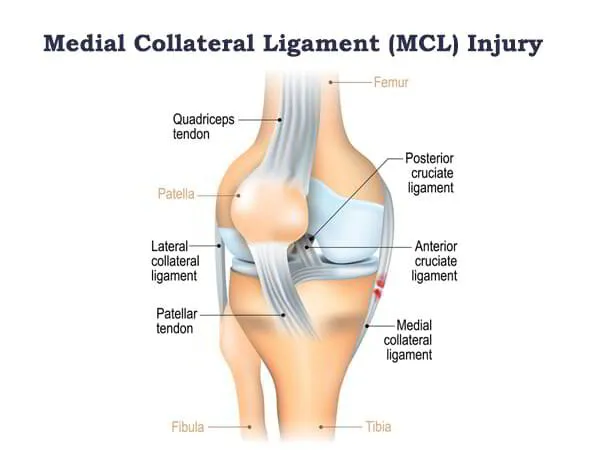Medial Collateral Ligament (MCL) Reconstruction
Home / Area of Specialty / Knee / MCL Reconstruction Surgery
Dr. Pradyumna R carefully evaluate your conditions and symptoms associated to your knee pain and injuries, based on the diagnostic report and scan he would suggest if so, you are a candidate for Medial Collateral Ligament (MCL) Reconstruction Surgery procedure, he is an highly experienced knee treatment specialist provide diagnosis as well as surgical and nonsurgical treatment options at Bangalore Orthopaedic Clinic, in BTM Layout, Bangalore.
If you have any queries or would like to schedule an appointment for Medial Collateral Ligament (MCL) Reconstruction procedure or knee pain or knee injury treatment consultation please call +919113025188.
What is MCL Reconstruction?
A knee injury to the medial collateral ligament (MCL) injuries can be caused by a direct impact to the knee or sudden stop and lead to various results it to stretch, minor sprains, and pain, swelling, partial or complete tears of the ligament, or joint instability.
Reconstruction surgery for an MCL tear is necessary for athletes who have multiple knee issues, when the ligament has been completely torn, or if the ligament is not functioning correctly. Your surgeon will reattach or reconstruct the damaged tendon.
What are the symptoms of an MCL tear?
The symptoms of an MCL tear can vary based on how your ligament is injured. If your MCL (medial collateral ligament) is torn, you may experience the following signs and symptoms:
- Knee Pain
- Knee Swelling and Stiffness
- Knee joint lock or catch
- At the time of injury having a popping sound
What are the test to diagnose MCL tear?
A diagnosis of a medial collateral ligament injury is made after a physical examination of the knee and diagnostic tests.
Recognizing an MCL injury can be difficult, especially if there are other injuries or medical conditions that could mimic the symptoms. A doctor can help identify the specific injury by running medical tests and imaging scans to ensure a safe diagnosis.
An MCL tear can be diagnosed with arthroscopy and magnetic resonance imaging. You may also have an X-ray for other reasons. However, most MCL injuries are detected by putting pressure on the inside of the knee joint. If you have instability in your knee, this method is done in combination with either an X-ray or magnetic resonance imaging (MRI).
How is an MCL tear treated?
Management
The non-surgical treatment for a MCL tear involves ice, physical therapy (which may include the use of crutches), and a brace to immobilize the knee. Some treatments also include an injection of medication into the knee.
Surgical procedure
The procedure is performed in an outpatient setting under general anaesthesia. During the surgery, the surgeon makes an incision over the medial femoral condyle. A small section of the tibia is removed and a guide wire is inserted into the defect; this helps to guide a metal tube into the gap. Next, the PTB nail, which is made from metal, is driven up to its head in the upper end of the bone tunnel. The tube containing bone marrow cells derived from your adipose tissue is then implanted into the area where you have had surgery and secured with two screws. The incisions are closed with sutures or surgical staples if necessary.'
Postoperative Care following MCL Reconstruction surgery
Following MCL reconstruction surgery, you will gradually begin to regain motion in the knee and start putting weight on the leg. Toe-touching and weight-bearing are allowed with the brace locked to keep the knee in full extension during this time. After 2 weeks, you will have up to 30 degrees of movement and will start incrementally bearing more weight. At 4 weeks, you may flex your knee from 60 degrees up to 90 degrees and will no longer use a brace. At 6 weeks, you may walk without crutches or a brace unless instructed otherwise by your healthcare provider.
What are the risks and complications?
Complications are not uncommon following reconstruction of the MCL. The most common complications include knee stiffness and residual instability. In more serious cases, the patient can develop numbness, infections, blood clots (deep vein thrombosis), damage to nerves or blood vessels, loosening of the graft, and decreased range of motion.
For more information on medial collateral ligament (MCL) reconstruction or repair or for additional resources regarding knee ligament injury treatments, please call +919113025188. Dr. Pradyumna R, orthopedic knee specialist serving BTM Layout, Bangalore City.

